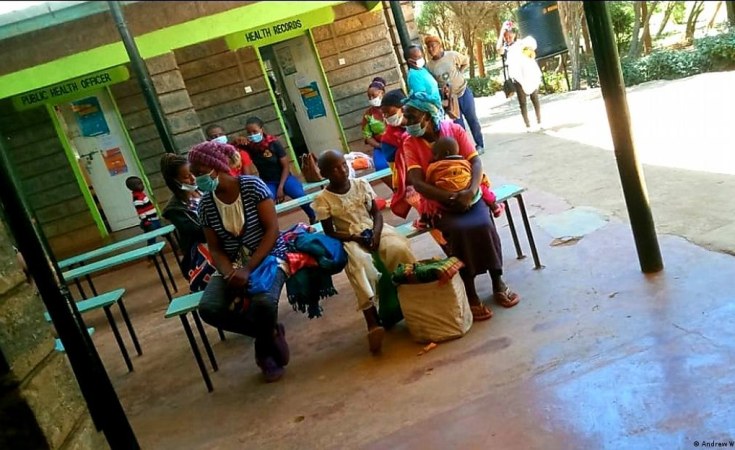Kenya's overburdened and underfunded healthcare system has ground to a near halt after about 7,000 medical professionals walked off the job last month to demand better working terms.
Health workers are the backbone of a functional health system in any country. However, Kenya's system began to crumble in mid-March when doctors and medical workers began a nationwide strike over pay and working conditions, disrupting services for thousands of patients in the East African nation.
The medical workers, led by the Kenya Medical Practitioners, Pharmacists and Dentists Union (KMPDU), want the government to fulfill a labor agreement signed in 2017, which promised higher salaries and better working conditions for medical workers, as well as the hiring of intern doctors.
Kenya's government said it would meet some of the medics' demands -- including hiring interns on permanent contracts and paying arrears due under a 2017 agreement -- but ruled out any further concessions due to a lack of funds.
"We cannot continue to spend the money we do not have," said Kenyan President William Ruto, who has embarked on cost-cutting measures since taking office in 2022.
"I am telling our friends the doctors that ... we value the service they give to our nation but we must live within our means."
The medics rejected the government's offer and insisted that they would not return to work until their demands were met in full.
Dr Davji Atellah, the KMPDU's secretary general, said that, "we cannot speak about universal healthcare while we have no budget for health workforce."
The government should 'stick to its word'
Dr Simon Kigondu, a Kenyan obstetrician, gynecologist, and president of the Kenyan Medical Association, said that setting up a health service commission would perhaps have prevented the current deadlock.
Kigondu told DW that they had proposed a commission to manage the Kenyan health system's human resources.
"For instance in this scenario where the Ministry of Health claims that it did not budget for medical officer intact, the Health Service Commission would have known that there are these number of medical interns and they budgeted for them," Kigondu said.
Kigondu echoed the demands of the striking workers, calling on Ruto's government to stick to its word.
"The government should actually honor the collective bargaining agreement and then come to the table and try to bargain for the next collective bargaining agreement," he said.
Kigondu added that, "a government cannot sign an agreement, then fail to abide by it and expect the people they govern to abide by other agreements."
Until now, there is no clear sign of how or when Kenya's ongoing protest will end.
Medics flee poor pay in Cameroon
Meanwhile, on the other side of the African continent, Cameroon has a medical crisis of its own.
The National Medical Council said that health care delivery remains very difficult in West African country, where the doctor-to-patient ratio stands at 1 doctor per 50,000 patients -- instead of the 1 doctor per 10,000 patients ratio recommended by the World Health Organization.
The council reported that doctors are fleeing to escape hardship, poor pay, difficult working conditions and unemployment.
Cameroon-based DW correspondent Moki Edwin Kindzeka said there is a serious problem of doctors being unable to find work.
"Several thousand of them since they started being trained in 2013, that's about 14 years ago, have not been employed by the government of Cameroon," Kindzeka said, adding that some end up staying home, working for private clinics -- or leaving the country.
"You train thousands of doctors who are not recruited, and only 20 are recruited per year in private clinics where they earn less," Kindzeka added. "Those who at home struggle on their own at times sit waiting, applying to be recruited by the government and asking to be recruited by foreign nations."
This dire situation has led doctors to seek jobs in Gabon, Central African Republic, Sudan, and even as far away as Canada and the United States.
According to the National Medical Council in Cameroon, about 6,000 to 7,000 doctors have left the country. But some remain in the country waiting for the opportunity to work.
"So the people are begging to work. They say they want to work. Some of them tell you they don't want to leave the country. They want to stay in their country and work. They want to help the suffering in their country. Yet they're not giving that opportunity to do that."
'No patriotism on empty stomachs'
In his presidential speech, Cameroonian President Paul Biya voiced concern about the youth emigrating. Biya urged Cameroonians to be patriotic and serve their homeland -- a sentiment that was not well received by many young people.
"When I went around doing a report, I discussed with some of the doctors and asked their reaction to the president's call for them to be patriotic," Kindzeka told DW.
"They said they would not be patriotic on an empty stomach. They are going for where duty calls and duty calls, according to them in Canada."
Moki Edwin Kindzeka in Cameroon contributed to this report
Edited by: Keith Walker


